|
|
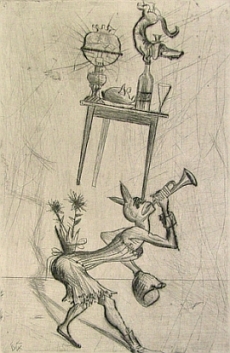 Balancing Act
Otto Dix
1922
Transforming Reality
Patten and Design in Modern and Self-Taught Art
Galerie St. Etienne
via ______________________________________
Theory
Laura Carter
post-dérives
Theory is so incredibly attractive and enticing that when I feel it pulled from me I immediately retort: "in substance, nature is philosophy." Or: "the awkwardness of this dress is the most wonderful thing."(...)
Tonight I am thinking that Blake's vision and belief are the only cure for mundanity and abjection, and I am almost willing to do whatever I need to do (paint, sing, write, read, theoria) to try to keep it alive.... (more)
______________________________________
The great American statesman Benjamin Franklin, a Deist, said, "I have found Christian dogma unintelligible. Early in life, I absented myself from Christian Assemblies." President Thomas Jefferson, also a Deist, was even more anti-Christian: "The Christian god is a three headed monster; cruel, vengeful and capricious." President Abraham Lincoln said, "The Bible is not my book nor Christianity my profession. I could never give assent to the long, complicated statements of Christian dogma."
But they lived in what might be considered more enlightened times: the 18th and 19th centuries.
David V Barrett
nthposition
______________________________________
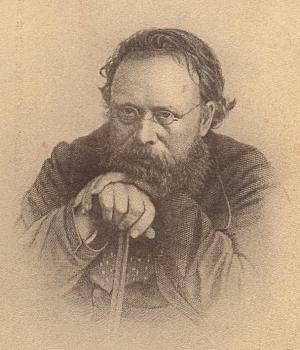 Pierre-Joseph Proudhon
15 January 1809 - 19 January 1865
From the origin of societies, the spirit of man, confined and enveloped by the theologico-political system, shut up in a hermetically closed box, of which Government is the bottom and Religion the top, has taken the limits of this narrow horizon for the limits of a rational society. God and King, Church and State, twisted in every way, worked over to infinity, have been his Universe. For a long time he has known nothing, imagined nothing beyond. At last, the circle has been traversed; the excitement of the systems suggested by this has exhausted him; philosophy, history, political economy, have completed the triangulation of this inner world; the map of it has been drawn; and it is known that the supernatural scheme which humanity contemplates as its horizon, and its limit, is but itself; that, far as humanity may look into the depths of its consciousness, it sees but itself; that this God, source of all power, origin of all causality, of which humanity makes its sun, is a lamp in a cavern, and all these governments made in his image are but grains of sand that reflect the faint light.
These religions, these legislations, these empires, these Governments, this wisdom of State, this virtue of Pontiffs, all are but a dream and a lie, which all hang upon one another and converge toward a central point, which itself has no reality. If we want to get a more correct idea of things, we must burst this crust and get out of this inferno, in which man's reason will be lost, and he will become an idiot.
- Pierre-Joseph Proudhon, General Idea of the Revolution in the Nineteenth Century, 1923 English translation
______________________________________
Thing of Beauty
Jackson Mac Low
edited by Anne Tardos
Review by Ron Silliman
Thing of Beauty differs from Representative Works in some important ways beyond its generous representation of material from the last two decades of Mac Low’s life. Its selection from the early years, literally 48 years of writing, is necessarily 100 pages shorter than the earlier book. But even more important, Tardos has done a much better job than Mac Low himself in organizing these materials to create a coherent path through one of the largest & most ambitious oeuvres ever. Perhaps Jackson was just too close to his own projects – one can sense the level of anxiety he often felt about pieces from his lengthy performance instructions & even some of the more elaborate copyright notices he insisted upon over the years. (Alternately, I can imagine some reader kvetching that TofB lacks the inherent messiness that was a characteristic feature of everything Mac Low seemed to produce.)
Tardos’ organization makes this a perfect “first book” for anyone who may be interested in starting to explore Mac Low’s work. My own sense is that you will quickly want to turn from these brief selections – there are just ten Light Poems (of which no “complete” edition has ever appeared in print), just seven of the 100 poems that compose The Twenties, just ten pages to represent the 424 of Stanzas for Iris Lezak, etc. – and start a collection of everything you can get your hands on. Reading Thing of Beauty is really both wonderful – the work is so good, so varied, so well-intentioned – and yet it left me longing. Both for what’s not here in terms of the text, and for Jackson himself – it’s the best representation of the whole person he ever had.
Perhaps the most telling absences here are those that would more properly have appeared on a CD & a DVD, documentation of Mac Low’s performances, the intersection between poetry & contemporary post-classical music that is so important for Mac Low (He is alleged to have taught chance technique to John Cage & certainly Mac Low is a much more powerful user of these tools in the field of literature)... (more)
______________________________________
Young Turtle Assymetries [mp3]
Jackson MacLow
chance-generated poems for five simultaneous readers
9 mins. 53 secs.
Aspen
Introduction To The Young Turtle Assymetries
Aspen
Asymmetries are nonstanzaic chance-generated poems of which the printed formats are notations for solo or group performances. They are asymmetrical in that they have no regularly repeating stanzaic or other patterns. They are notations in that most aspects of their format can be translated into aspects of performance. Notably, the lengths of blank space before, between, & after single words or word strings, & between lines, stand for temporal holes -- durations in which readers keep silent or produce single prolonged tones on instruments that can sustain tones evenly (e.g., winds; bowed strings; reed, pipe, or electronic organs; or other mechanical or electronic sound producers).
The words of all 5 Young Turtle Asymmetries were drawn from a single picture caption:
Young turtles, below, scuttle
to open water. Once the hatchlings
have found their way to the
sea, they embark upon a journey
whose course is a mystery.
No one knows where the turtles go.
This appeared with the article 100 Turtle Eggs, by Archie Carr, p. 51, Natural History, Vol. Lxxvi, No. 7 (Aug.-Sept. 1967: American Museum of Natural History, New York). ... (more)
Aspenubuweb a multimedia magazine of the arts published by Phyllis Johnson from 1965 to 1971. Each issue came in a customized box filled with booklets, phonograph recordings, posters, postcards — one issue even included a spool of Super-8 movie film. It's all here.
______________________________________
1st Light Poem: For Iris -- 10 June 1962
The light of a student-lamp
sapphire light
shimmer
the light of a smoking-lamp
Light from the Magellanic Clouds
the light of a Nernst lamp
the light of a naphtha-lamp
light from meteorites
Evanescent light
ether
the light of an electric lamp
extra light
Citrine light
kineographic light
the light of a Kitson lamp
kindly light
Ice light
irradiation
ignition
altar light
The light of a spotlight
a sunbeam
sunrise
solar light
Mustard-oil light
maroon light
the light of a magnesium flare
light from a meteor
Evanescent light
ether
light from an electric lamp
an extra light
Light from a student-lamp
sapphire light
a shimmer
smoking-lamp light
Ordinary light
orgone lumination
light from a lamp burning olive oil
opal light
Actinism
atom-bomb light
the light of an alcohol lamp
the light of a lamp burning anda-oil
9 Light Poems
Jackson Mac Low
1922 - 2004
______________________________________
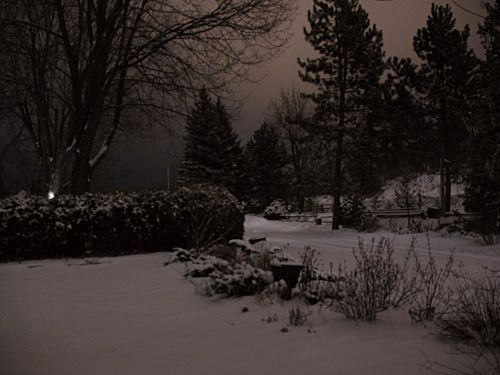 late night snow light
end of January thaw
photo - mw
______________________________________
th wintr peopul
ar responding 2 th green hous effekt evree
few yeers they find it 2 warm n go furthr
north 4 comfort toronto is now 2 cozee 4
them th sault n thundr bay r far 2 summree
they feel th warmth 2 b frivolous it makes
them un eezee 7 yeers ago aftr having found
nu liskeard 2 mediterranean th wintr peopul
discovr church hill falls 2 b mor balmee thn
they wud want n ar hedding tord th artik
circul evn ther they bcame restless th artik
was warming up if it heets up evree wher
wher will th wintr peopul go full uv needs 4
snow n icikul pellets flying in th freezing rain
n snow hills n mountains mooving around th
elk n polar bears th sun glayzlng on th ice
fields th hallucinating cold n steem from
theyr wishes 4 th souls fire not distraktid by
anee gud wethr
Bill Bissett
.....................................................................
bill bissett: controversies and definitions
Don Precosky
in the whirlwing
drawings, poems and performances by bill bissett ______________________________________
Vocality is lost in silence, and yet it is also always potentially present. This silence is both nothing more than a single moment and also infinite. We lose our voice in an equivocity that reminds us of the simultaneity of our singularity and plurality. It reminds us that it is possible to be together. Serres summarizes the position as follows:
There is a path from the local to the global, even if our weakness forever prevents us from following it. Better yet, noise, sound, discord--those of music, voices, or hatred--are simple local effects. Noise, cries and war, has the same extent of meaning, but symmetrically to harmony, song and peace . . . . Chaos, noise, nausea are together, but thrown together in a crypt that resembles repression and unconsciousness known as appreciation. We often drown in such small puddles of confusion.
The locality of the self, of the vocalic body reflecting both the subjecthood of the self and itself as subject, divides us once more. It becomes a noisy place as localities compete on the path to the global, to the dream of equivocity. But univocity is often the menacing reality. Walking this path successfully is not easy. We cannot simply talk it through. Reinvigorated by silence, I can begin to communicate its existence and then later its special turns and snares. I lose my voice well as I remember how to listen to silence. - Marc Botha, How To Lose Your Voice Well
 Bridge over Cedar Creek
Rockingham Co, VA, May 22 1883
S. Fisher Corlies
(1830 - 1888 )
George Eastman House
Still Photograph Archive
234 Selected Images
______________________________________
Bodies in Transit: The Plastic Subject of Alphonso Lingis [PDF]
Tom Sparrow
Janus Head
One is born with forces that one did not contrive. One lives by giving form to these forces. The forms one gets from the others.
-- Alphonso Lingis, "We Mortals"
lphonso Lingis is well-known in the Anglophone world for his transla- tions. We continental philosophers have all read his renderings of Levinas' Totality and Infinity and Merleau-Ponty's The Visible and the Invisible. He has also gained an admirable following with his philosophical travelogues, books like Excesses, Abuses, and Trust. In a way, even these texts offer us translations: of unfamiliar customs and peoples, of technical concepts and slippery philosophical jargon. In the travelogues, readers witness phenom- enological descriptions of individuals and cultures which are laced with the thinking of alterity familiar to Levinas' readers, and the phenomenology of the lived body that Merleau-Ponty has handed down to the continental tradition. Set either between or beyond these two notions--alterity and the lived body--is Lingis himself, a philosopher who not only builds a bridge between American and continental thought, but who is the literal embodiment of a synthetic brand of American continental philosophy. As if William James and Emmanuel Levinas were co-opted to author all of the guide books in the Lonely Planet series, many of Lingis' hybrid books read like reports from the field. His missives from Latin and North America, the Far East, Antarctica, Africa, and Europe set Lingis apart from the rest of the American philosophers working in Husserl's wake. His (inter)continental approach spans the globe and reaches beyond the technical skirmishes of academic philosophy.
.....................................................................
Heralding a welcome arival
Janus Head 10.1
Journal of Interdisciplinary Studies
in Literature, Continental Philosophy,
Phenomenological Psychology, and the Arts
Celebrating Our 10th Volume
.....................................................................
from
Fourteen poems from Breathturn [PDF]
Paul Celan
translated by John Felstiner...
What’s written goes hollow, what’s
spoken, seagreen,
burns in the bays,
dolphins race
through
liquefied names,
here in forevered Nowhere,
in a memory of out-
crying bells in – but where?,
who
in this
shadow quadrant
is grasping, who
underneath
glimmers up, glimmers up, glimmers up? ...
John Felstiner's translations of Pablo Neruda [PDF] .....................................................................
I've been feeding on Janus Head since I first stumbled into whatever it is I do here. You can support this fine publishing project and do yourself a favour by subscribing to the hard-copy - mw ______________________________________
 Not a girl who misses much Pipilotti Rist Video Works compilation
Ubuweb via
that-unsound
majena mafe
exploring correlations between sounded oralities and the perverse as a possible point of departure for 'womens' experimental/ innovative/ecriture/language frames, that 'allow' just that bit extra
______________________________________
Whatever being
Jodi Dean on Dominic Pettman's Love and Other Technologies
I cite
Pettman reminds us that whatever being is the mode of 'coming community' and the coming community is based on an 'inessential commonality.' His elaboration of the point is valuable:
this entails a fundamental revision of what it means to be a person: to declare that uncoded existence precedes the modern circumscriptions of citizenship, family, religion, ethnicity, and other blood-soaked calls to an essential identity.
Whatever beings don't consist in anything in particular, anything essential. Their associations don't presuppose bases in anything typically associated with essential human being. The coming community, then, is not an association of citizens. Nor is it a tribe or religion. I would guess that common history is also out as a basis, insofar as the problem is with the need to establish a basis for commonality. So, what then, is whatever being? Can we glimpse it? Will we know it when we see it? Or, if we use the notion as a way of thinking about forms of being and becoming in the present, might it help us imagine the present and possible futures differently?... (more) ______________________________________
A Thinker in a Man's World
Romain Leick
Translated from the German by Christopher Sultan
The 100th birthday of Simone de Beauvoir, philosopher, writer and feminist, has sparked a resurgence of interest in her writing -- independently of Sartre. ______________________________________
 Dale
Pacifica, 2006
Katy Grannan 1 2 3 4
Katy Grannan Is Everywhere
The Exposure Project
______________________________________
The Noise of the World - (PDF)
Michael Filimowicz
Janus Head
Silence is an effect, specifically, a technological and architectural effect, a hyperquiet that perhaps can trace its lineage to the invention of masonry walls, i.e. walls composed of solid planes and thus impermeable to the sounds that might creep in through a mesh of leaves or the gaps in bundled saplings. Silence as a fantasy or an act of imagination will thus be linked to a certain stage of civilization. For we can imagine the difference between death in the jungle and death in the polis. In the former situation, one imagines that the cessation of movement on the part of the deceased may lead to a heightened sensitivity to the surrounding activity of the place--the animal sounds, the wind in the foliage; in other words, all that may have been tuned out when giving attention to another would uncannily return to the foreground. By contrast, city death implies the silence of the tomb, prepared somewhat by the echoey sonorousness of the temple. Thus silence can be linked to a certain stony sense of enclosure, interiority, and ultimately--implosion. ______________________________________
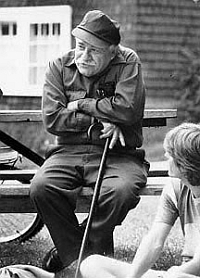 Murray Bookchin
January 14, 1921 – July 30, 2006 co-founder of the Institute for Social Ecology
In our own time we have seen domination spread over the social landscape to a point where it is beyond all human control. . . . Compared to this stupendous mobilization of materials, of wealth, of human intellect, of human labor for the single goal of domination, all other recent human achievements pale to almost trivial significance. Our art, science, medicine, literature, music and “charitable” acts seem like mere droppings from a table on which gory feasts on the spoils of conquest have engaged the attention of a system whose appetite for rule is utterly unrestrained.
- Murray Bookchin
Social Anarchism or Lifestyle Anarchism: An Unbridgeable Chasm
Murray Bookchin
Interview with Murray Bookchim Harbinger, A Journal of Social Ecology Murray Bookchin, Visionary Social Theorist
ZNet
Anarchy Archives
Research Center on the History and Theory of Anarchism
______________________________________
 Shanty in the woods
Matthews Duckling Pond
1884
S. Fisher Corlies
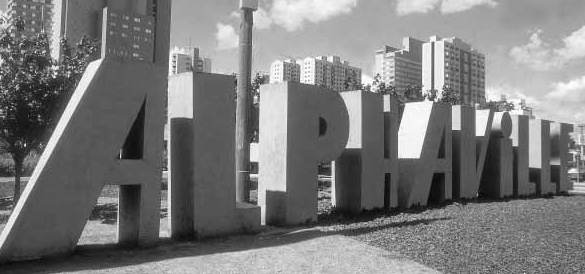 .....................................................................
.....................................................................
Alphaville São Paolo
Chris Darke edited extract from Alphaville by Chris Darke (London, IB Tauris, 2005) Visions of the City
Seven and a half miles from the heart of São Paulo there is a gated community which houses 30,000 of the city’s richest and most security conscious residents, many of whom travel by helicopter to work among the 17 million other inhabitants of the world’s third largest city. According to the Washington Post, ‘at night, on “TV Alphaville,” residents can view their maids going home for the evening, when all exiting employees are patted down and searched in front of a live video feed.’ In his account of ‘a walled city where the privileged live behind electrified fences patrolled by a private army of 1,100,' the Post’s correspondent failed to discover which keen ironist had named the development after the film by Jean-Luc Godard. Nor, I suppose, would it have been much appreciated had the reporter, as he flew low over the teeming favelas, the prisons and choked highways, casually asked his host, a CEO and Alphaville resident, ‘You do realise you’re living in a movie, don’t you?’(...)
In the forty or so years separating Alphaville from Demonlover it has become evident that the no-place of Godard’s dystopia, with its labyrinth of corridors and lobbies, was already one big non-place in waiting. The presence of the future that Godard was keen to capture back in 1965 has since taken shape as a global nonplace crossing continents and time-zones. ‘It may be that we have already dreamed our dream of the future’, J.G. Ballard has mused, ‘and have woken with a start into a world of motorways, shopping malls and airport concourses which lie around us like a first instalment of a future that has forgotten to materialize.’ Or, to put it another way, Alphaville exists. Everywhere.
... (more) Visions of the CityVol 1 Issue 1 Winter 2007/8
______________________________________
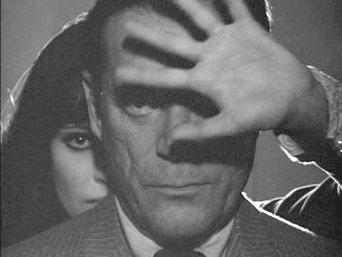 Alphaville
Jean-Luc Godard
complete movie
Everything has been said, provided words do not change their meanings, and meanings their words.
- Alpha 60
______________________________________
What We Know As We Know It:
Reading "Litany" with JA
As We Know (1979)
Ann Lauterbach
conjunctions
It has long been my contention, or suspicion, or just unverified hunch, that John Ashbery (like Gertrude Stein) has had some relation to William James and American pragmatism. Ashbery's reluctance to make any statement or declaration that does not appear to arrive and disappear on the heels of his miraculous syntax seems to me evidence of the kind of conceptual relativity that James first enunciated in the early years of the twentieth century. Ashbery's joyous investment in a present reality as being inimical to what James called "copying" is further evidence: Ashberian poetics insists on the multidimensionality of time-space duration, as opposed to either pictorial mimesis or the cause-and-effect order of conventional, developmental narration: reality, for Ashbery, has neither linearity nor replica. Connections among thinking and feeling, knowing and doing are always in flux.
The light that was shadowed then
Was seen to be our lives,
Everything about us that love might wish to examine,
Then put away for a certain length of time, until
The whole is to be reviewed, and we turned toward each other.
The way we had come was all we could see
And it crept up on us, embarrassed
That there is so much to tell now, really now.
—" As We Know"
... (more)
______________________________________
 flood waters
January thaw
photo - mw
______________________________________
Toward the Surface
David Huerta
translated by Mark Schafer
conjunctions
The surface is dark. From every shadow that encircles and surrounds it with the pressure of black dahlias against green windowpanes, palates emerge to taste the light of the world. Issuing from every umbral mouth that presses against the surface with the passion of inflamed lips, a multitude of tongues pronounces reality and savors the seasonings that take the form of accidents and facts, of data and chilly encyclopedias.
The surface is taut and dark, far darker and more complicated than the depths of wells or the self-styled profundity of philosophy. The surface is cold, blue, removed in its arctic suit of armor—and indifferent, although at times we hold it close to the hot tip of our nose.
The heat of the surface is usually a lost kingdom: summer slid away and then gone, weak undulations rising over the hoods of cars. Then night comes and gives the cold back to the surface: car chassis are again themselves, subject to the dictates of the surface that was heating up and cooling down, denatured.
The surface is cold and dark like ice in the polar night. But its coldness is not that of frozen lakes, but rather that of the lifeless hides in the morgue or the stained mirrors we confuse with the cosmos in a bathroom in the dim light, in the exhaustion of physical suffering and of diverse spiritual afflictions.
The surface lacks history and when words cover it they say nothing, are mute scraps mistaken for nicks or stains. The surface erases wrinkles and blemishes, smoothes out ridges, tames the shaggy savagery of the convolutions and toothed corners in the undefended gullet of the days rushing by. The surface's lack of history makes it responsive to the experience of death: its territory could be pain, the curved shouts of the rending of emotions and its abundance magnetized on the nervous systems.
The darkness of the surface inhabits the sad flesh of animals and people and the bundles of malignant gifts ruled by interest and usury. Nevertheless, the darkness of the surface has a nutritious, enormously fertile quality: an indecipherable morning shore that reveals itself with disconcerting generosity to the gaze of life. The loving surface is a concentrated sheet of fire whose epidermis is always about to explode into taut cubes and popping sparks of contact.... (more)
______________________________________
 photo - mw ______________________________________
How It Begins
John Latta......
In the reckless dismemberment of
My history, my rout out
Of the rubble, I fossick
The black notebook, find something
White as a clock, and
Post-architecturally soft, draped off
The tines of the unconniving
Fork of an angry god: ... (more)
 detail
Loen, Kjendalskronebrae
Nordfjord, Norway
Photochrom Prints
ca. 1890-1905
about 5,900 items
available in very high resolution
The Library of Congress
______________________________________
The Lost Art of Cooperation
Benjamin R. Barber
The Wilson Quarterly
What’s gone wrong here? Why, as a nation, are we so obsessed with competition, so indifferent to cooperation? For starters, competition really is as American as apple pie. America has always been deeply individualistic, and individualism has presumed the insularity and autonomy of persons and, thus, a natural rivalry among them. Capitalism also embraces competition as its animus, and America is nothing if not capitalistic. Even the American understanding of democracy, which emphasizes representation and the collision of interests, puts the focus on division and partisanship. There are, of course, democratic alternatives. Systems of proportional representation, for example, aim to ensure fair representation of all parties and views no matter how numerous. But our system, with its single-member districts and “first past the post” elections, is winner take all and damn the hindmost, a setup in which winners govern while losers look balefully on, preparing themselves for the next battle.
This has never been more so than in this era when politics has, in Jonathan Chait’s recent portrait in The New Republic, become “an atavistic clash of partisan willpower,” with Christian Right pitted against the Netroots Left in a polarized media environment defined by hyperbolic talk radio and the foolish excesses of the blogosphere. Moderation, cooperation, compromise, and bipartisanship are lame reflections of a pusillanimous past and of a “pathetic and exhausted leadership” incapable of winning elections. Even more than the Founders, the new political crusaders of Left and Right prefer King Lear’s version of politics—“who loses and who wins; who’s in, who’s out”—to the aspirations of communitarians and republicans who seek to establish a common good. Polarization is more an ideal than a pathology, and incivility is politics properly understood. ... (more)
______________________________________
Tools For Conviviality
Ivan Illich
1926 - 2002
______________________________________
Twelve Ways to Know the Past
Athanasios Moulakis
______________________________________
 William James
January 11, 1842 – August 26, 1910 .....................................................................
One Hundred Years of Pragmatism
Theo Anderson wilson quarterlyWhen William James retired from Harvard in 1907, after 35 years on the school’s faculty, it felt like the beginning of a new life. As Professor James, he once confessed to his brother, Henry, “I always felt myself a sham, with its chief duties of being a walking encyclopedia of erudition. I am now at liberty to be a reality.” Perhaps no retirement has ever begun more productively than James’s. ... (more)
______________________________________
Precision + Guided + Seeing
Jordan Crandall
ctheory
A large body of theoretical work has focused on the delocalizing or deterritorializing effects of real time technologies. They are often regarded as having contributed to the evacuation of geographical space, overriding the specifics of place and distance. Virilio, for example, has often suggested that real time technologies and their accompanying dimension of "liveness" have prompted the disappearance of physical space -- in other words, that "real time" has superceded "real space." For him, such deterritorialization can only lead to inertia.
What we are witnessing today, however, is not a one-way delocalization or deterritorialization, but rather a volatile combination of the diffused and the positioned, or the placeless and the place-coded. Perhaps nowhere has this been more apparent than with mobile GIS and location-aware technologies. These technologies and discourses are serving to weave together degrees of temporal and spatial specificity. They are helping to generate an emerging precision-landscape where every object and human is tagged with geospatial coordinates: a world of information overlays that is no longer virtual but wedded to objects and physical sites. Communication is tagged with position, movement-flows are quantified, and new location-aware relationships are generated among actors, objects, and spaces.... (more)
______________________________________
The “Good War” is a Bad War
John Pilger
The reason the United States gave for invading Afghanistan in October 2001 was “to destroy the infrastructure of al-Qaeda, the perpetrators of 9/11". The women of RAWA say this is false. In a rare statement on 4 December that went unreported in Britain, they said: “By experience, [we have found] that the US does not want to defeat the Taliban and al-Qaeda, because then they will have no excuse to stay in Afghanistan and work towards the realization of their economic, political and strategic interests in the region.”
The truth about the “good war” is to be found in compelling evidence that the 2001 invasion, widely supported in the west as a justifiable response to the 11 September attacks, was actually planned two months prior to 9/11 and that the most pressing problem for Washington was not the Taliban’s links with Osama Bin Laden, but the prospect of the Taliban mullahs losing control of Afghanistan to less reliable mujahedin factions ...(...)
...the tactical victory in Afghanistan in 2001, achieved with bombs, has become a strategic disaster in south Asia. Exacerbated by the assassination of Benazir Bhutto, the current turmoil in Pakistan has its contemporary roots in a Washington-contrived war in neighboring Afghanistan that has alienated the Pashtuns who inhabit much of the long border area between the two countries. This is also true of most Pakistanis, who, according to opinion polls, want their government to negotiate a regional peace, rather than play a prescribed part in a rerun of Lord Curzon’s Great Game.... (more)
______________________________________
Barack, Hillary, and the Sinister Nothingness of “Change”
Glen Ford
When politicians offer nothing, and the people demand nothing, then the powers-that-be are free to continue doing whatever they choose. The death knell of participatory politics can often be a very noisy, celebratory affair - such as we have witnessed in the call-and-response ritual of “Change!” “Hope!” and other exuberant but insubstantial campaign exercises. Finally, the most accomplished slickster in presidential history, Bill Clinton, was compelled to expose Barack Obama’s “fairy tale” anti-war history - some truth for a “change.” Black Agenda Report knows the story very well, after more than four years of observing Obama’s descent from vaguely progressive rhetoric to shameless pandering (to whites) and vapid “Change!” mantra nonsense. Only the rich can win this game.... (more)
______________________________________
 Beggars' Bridge
Whitby, Glaisdale
Yorkshire, England
detail
Photochrom Prints
ca. 1890-1905
______________________________________
"Obedient To A Gypsy Itch..."
Sergey Gandlevsky
Translated from the Russian by Philip Metres
Obedient to a gypsy itch,
Someday we´ll cram our suitcase full.
Someday we´ll stand on platforms
In strange and deafening lands.
We´ll make our circuitous way
Like a daring February snowstorm,
And someday above Kelny city
We´ll light the table lamps.
The smoky nights drag on.
Goodbye, do svidanya, adieu.
As a hunted animal runs
From death, humans run from life.
Nearing old age, with a tourist trunk,
I´ll head off--shaking before my time--
With a flawlessly Austrian face,
And, let´s say, a Turkish wife.
Depressively choosing his words,
An intelligent student will show us
The sights of some boundless place:
Baikal, Leningrad, Tashkent.
The vast Russian land,
A trunk in an old man´s hand.
What will I ask my heart then,
And in what language?
A selection of Philip Metres poetry is available here
Poetry Philip also maintains Behind the Lines: Poetry, War, & Peacemaking
 Aleksey Mazurin
Winter
Quiet Resistance
Russian Pictorial Photography 1900-1930s
Moscow House of Photography
______________________________________
An Answer
by Zbigniew Herbert
Translated by John Carpenter and Bogdana Carpenter
This will be a night in deep snow
which has the power to muffle steps
in deep shadow transforming
bodies to two puddles of darkness
we lie holding our breath
and even the slightest whisper of thought
if we are not tracked down by wolves
and the man in a Russian sheepskin who swings
quick-firing death on his chest
we must spring and run
in the clapping of short dry salvos
to that other longed-for shore
the earth is the same everywhere
wisdom teaches everywhere the man
weeps with white tears
mothers rock their children
the moon rises
and builds a white house for us
this will be night after hard reality
a conspiracy of the imagination
it has a taste of bread and lightness of vodka
but the choice to remain here
is confirmed by every dream about palm trees
the dream is interrupted suddenly by the arrival of three
tall men of rubber and iron
they will check your name your fear
order you to go downstairs
they won’t allow you to take anything
but the compassionate face of the janitor
Hellenic Roman Medieval
East Indian Elizabethan Italian
perhaps above all French
a bit of Weimar and Versailles
we carry so many homelands
on the shoulders of a single earth
but the only one guarded
by the most singular number
is here where they will trample you into the ground
or with boldly ringing spade
make a large pit for your longing
from Elegy for the Departure by Zbigniew Herbert, translated by John Carpenter and Bogdana Carpenter
Words without Borders Forum is currently discussing Hebert.
Zbigniew Herbert: An Introduction
James Marcus
Expanses of the Unspoken: An Interview with Peter Dale Scott
one of the earliest translators of the work of Zbigniew Herbert
Cynthia Haven thanks to the Literary Saloon
______________________________________
 The Conversation
marmota
flickr
______________________________________
The Mind of the Market
Michael Shermer
Excerpt
I have spent thirty years in science dealing with such controversial topics as evolution, creationism, global warming, Holocaust denial, racial differences in I.Q., racial differences in sports, gender differences in cognitive abilities, conspiracy theories ranging from Pearl Harbor and 9/11 to the JFK, RFK, and MLK assassinations, alternative and complimentary medicine, reincarnation and the afterlife, and even God and religion. Yet, it has been my experience that as ruffled feathers go, economics is second to none in emotive volatility. If ever we need impartiality in our assessment of the facts — especially when the facts do not just speak for themselves — it is in economics. We must study the laws of human behavior in economies as the physicist, chemist, or biologist studies the laws of nature; and when we do so, because we are dealing with a subject to which most people are emotionally invested, we must make a ceaseless effort not to ridicule, bewail, or scorn human actions, but to understand them. Allow me to explain how I came to this subject.... (more) ______________________________________
What is postcolonial thinking?
An interview with Achille Mbembe
eurozine
Translation by John Fletcher
... postcolonial critique operates on several levels. On the one hand, like Edward Said in Orientalism, it deconstructs colonial prose: that is to say the mental set-up, the symbolic forms and representations underpinning the imperial project. It also unmasks the potential of this prose for falsification – in a word, the stock of falsehoods and the weight of fantasizing functions without which colonialism as a historical power-system could not have worked. In this way it reveals how what passed for European humanism manifested itself in the colonies as duplicity, double-talk and a travesty of reality.
Indeed, colonization never ceased telling lies about itself and others. As Frantz Fanon explains so clearly in Black Skin, White Masks, the procedures for racializing the colonized were the driving force behind this economy of duplicity and falsehood. In postcolonial thinking, race is the wild region, the beast, of European humanism. To borrow Castoriadis's terms on racism, I'd say that the beast puts it more or less this way: "I alone possess value. But I can only be of value, as myself, if others, as themselves, are without value".
Postcolonial thinking aims to take the beast's skeleton apart, to flush out its favourite places of habitation. More radically, it seeks to know what it is to live under the beast's regime, what kind of life it offers, and what sort of death people die from. It shows that there is, in European colonial humanism, something that has to be called unconscious self-hatred. Racism in general, and colonial racism in particular, represents the transference of this self-hatred to the Other.
There is a second level in the postcolonial critique of European humanism and universalism which, if the term had not given rise to so many misunderstandings, could be called biopolitical. The face of Europe which was experienced by the colony (and before that, under slavery, by the "plantation"), and which gradually became familiar, was far from being that of liberty, equality and fraternity. The totem which colonized peoples discovered behind the mask of humanism and universalism was not only deaf and blind most of the time, it was also, above all, characterized by the desire for its own death, but insofar as this death was necessarily conveyed through that of others, it was a delegated death.... (more)
______________________________________
 Untold Story
marmota
flickr via la main gauche
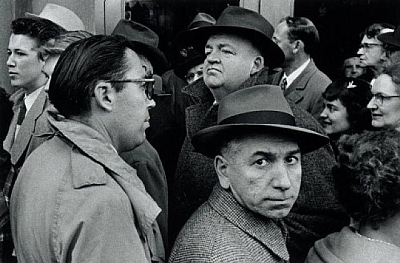 William Klein 1 2
______________________________________
Monstering: Inside America's Policy of Secret Interrogations and Torture in the Terror War
Tara McKelvey interview
identity theory
______________________________________
Chronological American Torture Omnibus
Michael Otterman
______________________________________
The Journal for Cultural and Religious Theory
The Religion of Fear: Conservative Evangelicals, Identity, and Antiliberal Pop [PDF]
Jason C. Bivins
The sensibility underlying these iterations of piety is ripe with references to hellfire and damnation, none of which will surprise even a casual observer of American religion: these festoon many a book cover, church sign ("Church on Fire!" or "Church Aflame!"), and newsletter; they embellish web pages and DVDs; they are both convention and curiosity. Each instantiation of this rhetoric or imagery draws from a common symbolic pool one which partakes equally of the thunder of prophetic religion and of America's love affair with spectacular violence yet there exists no country road which links them all together. Further, there seems to be no overt politics in these flashes of evangelical resistance. Nonetheless, these general impulses and images can be manipulable for political purposes. The fearful and the demonic have surfaced regularly in American evangelicalism, each time in a "fear regime" that has its own politics. A "fear regime" refers to the intersection of these political engagements with emotional registers of interpretation and perception. It is due largely to the sense of urgency conveyed in the emotional registers of these narratives that their political dimensions can be so effectively transmitted and appropriated by audiences and consumers. A "fear regime" thus functions closely to the "episteme" in Michel Foucault's The Order of Things, a culturally- or politically-produced conception of "truth" which ties together and grounds other social discourses. It also resembles William Reddy's "emotional regime," which he defines as a "set of normative emotions and the official rituals, practices, and emotives that express and inculcate them; a necessary underpinning of any stable political regime."
Measure and Democracy in the Age of Politics of Fright [PDF]
Peyman Vahabzadeh
The politics of fright is the politics of continuing with the violent, colonial project of reducing the irreducible plurality of human civilization to the mandates of certain cultural beliefs and values--namely, fundamentalist religiosity (Christianity, Judaism, Islam, Hinduism). I call it "fundamentalist" stricto senso: the politics of fright dwells in a monolithic and unchanging reading of religious edicts as "fundaments." It intends to retrieve and salvage what is deemed as essential and foundational out of the later, modern, and baffling mishmash of diversity and plurality of moral codes--prevalent in liberal democracies--that have in recent decades covered over those elemental moral codes associated with religion. As such, while fundamentalism itself involves an inescapable interpretive act, it steps away and condemns the interpretive acts that arise out of the recognition of today's cultural plurality that permeates every society on earth. The politics of fright, accordingly, amounts to a politics against consensus and public debate and instead asserts itself through unilateralism.
______________________________________
Ultimately, what seems to distinguish sacred violence from other acts of aggression is not its form but its intensity.
What’s "Sacred" about Violence in Early America?Killing, and dying, in the name of God in the New World
Susan Juster common-place
______________________________________
 Broadway and 103rd Street
1954-55
William Klein
______________________________________
from
Banalities
Brane Mozetic
translated by Elizabeta Žargi & Timothy Liu
Prague Literary Review
Why don’t I like soldiers? Because they make
children everywhere. Kill children. My best
memory of my father is of the photograph of him
in military uniform. All the rest have faded.
I have no idea where he disappeared, where he is.
I don’t remember one touch. Or I am
terrified by it. At the barracks we’d spend
the whole day walking here and there, cleaning our boots
hundreds of times, without question. Soldiers
always keep the peace. The same way the police
protect us. In uniform, all are somehow
equal. This bores me.
I always imagine empty heads
following a script that is
always the same. I’m afraid most people
have uniforms. Or they are close
to it. And when you once asked me
to put one on, I didn’t know
you were trying to brainwash me.
And when you later told me that you
had found a cop, I understood you.
Even at a young age I wasn’t any good at playing
cowboys and indians. I didn’t understand a thing.
Three from BanalitiesBrane Mozetic
Translated by Elizabeta Zargi and Timothy Liu more Brane Mozetic at Poetry International Web
______________________________________
from
Thinking Of Follows
Rosmarie Waldrop
3. Collage, Or, The Splice Of Life
I turned to collage early, to get away from writing poems about my overwhelming mother. I felt I needed to do something "objective" that would get me out of myself. I took books off the shelf, selected maybe one word from every page or a phrase every tenth page, and tried to work these into structures. Some worked, some didn't. But when I looked at them a while later: they were still about my mother. (As Tristan Tzara would have predicted. His recipe for making a Dadaist poem by cutting up a newspaper article ends with: "The poem will resemble you.")
This was a revelation--and a liberation. I realized that subject matter is not something to worry about. Your concerns and obsessions will surface no matter what you do. This frees you to work on form, which is all one can work on consciously. For the rest, all you can do is try to keep your mind alive, your curiosity and ability to see.
Even more important was the second revelation: that any constraint stretches the imagination, pull you into semantic fields different from the one you started with. For though the poems were still about my mother, something else was also beginning to happen.
Georges Braque: "You must always have 2 ideas, one to destroy the other. The painting is finished when the concept is obliterated."
(Barbara Guest would qualify that the constraints must be such that they stretch the imagination without disabling it.)
Collage, like fragmentation, allows you to frustrate the expectation of continuity, of step-by-step-linearity. And if the fields you juxtapose are different enough there are sparks from the edges. Here is a paragraph from A Key Into the Language of America that tries to get at the clash of Indian and European cultures by juxtaposing phrases from Roger William's 1743 treatise with contemporary elements from anywhere in my Western heritage. ... (more)
Rosmarie Waldrop at Electronic Poetry Center
Between Tongues
An Interview with Rosmarie Waldrop
Poet, translator and publisher
conjunctions
______________________________________
 Horn & Hardart
Lexington Avenue
1954-55
______________________________________
from
Lawn of Excluded Middle [PDF]
Rosmarie Waldrop
Words too can be wrung from us like a cry from that space which doesn’t seem to be the body nor a metaphor
curving into perspective. Rather the thickness silence gains when pressed. The ghosts of grammar veer toward
shape while my hopes still lie embedded in a quiet myopia from which they don’t want to arise. The mistake is
to look for explanations where we should just watch the slow fuse burning. Nerve of confession. What we let go
we let go.(...)
You were busy planting your picture of the world into your child’s mind. Mine, in comparison, seemed more like
the hotel slated for demolition, beyond redecorating. From the window, not the expected distance of beauty, but
a row of scraggy young trees facing a church covered from top to bottom with scaffolding which allowed only
rare glimpses of white volutes and projections. One of the trees seemed scraggier than the rest, perhaps blighted,
but on the whole it was 2 lines of wood at different stages, and I was learning to read between them as slowly as
possible. A hitch in time. The way a look into a mirror saves miles. If the scaffolding cast its shadow over your
boy, who was running circles around its posts, he remained unaware, his skin hardly darkened. He expects
definitions on the order of freeways and runaway nebula, not horizons contracting to flywheel and cog, hard
fiber in the pit of the stomach.(...)
I badly wanted a story of my own. As if there were proof in spelling. But what if my experience were the kind of
snow that does not accumulate? A piling of instants that did not amount to a dimension? What if wandering
within my own limits I came back naked, with features too faint for the mirror, unequal to the demands of the
night? In the long run I could not deceive appearances: Days and nights were added without adding up. Nothing
to recount in bed before falling asleep. Even memory was not usable, a landscape hillocky with gravitation
but without monuments, it did not hold the eye, did not hinder its glide toward the horizon where the prose of
the world gives way to the smooth functioning of fear. If the wheel so barely touches the ground the speed must
be enormous. ______________________________________
Memory Studies
Free Online Trial To Volume One
via Dylan Trigg
Side Effects
______________________________________
Henri Chopin (1922-2008) An Individual & Sound Poetry Beyond Bounds
David Baptise Chirot
______________________________________
Contemporary Aesthetics
Volume 5 (2007)
via Continental Philosophy
 January thaw
photo - mw ______________________________________
To keep photographing the same ice
In the same river flowing beneath the same bridge
Tying to link the shadow of a word to another word
Staring into the same sign of signs for nothing. David Shapiro, "The Sphinx, Again"
quoted in Written and Rewritten to Order The Gift of Generative Possibility in the Work of David Shapiro
Noah Eli Gordon Octopus Magazine #09
______________________________________
 Christian Rohlfs
1849 - 1938
______________________________________
from
The Saints
Michael Harris
We have confined them to small rooms
and narrow beds. They have to live in silence, but with
mice breeding hourly in their walls. Though our furnaces
steam fullbore through the night, we keep
the rooms of the saints very cold.
For solace, they look through the cellar keyhole
at the lost souls roaring at the light
which plasters them helplessly to the ceiling. ... (more)
Five poems
Michael Harris
Canadian Poetry Language Acts: Anglo-Québec Poetry, 1976 to the 21st Century
Editors: Jason Camlot & Todd Swift jacket
______________________________________
The Poem of a Life Notes
John Latta
Mark Scroggins’s Zukofsky biography, The Poem of a Life carries one along, willing and avid, between the ongoing weekend chores, the post-charivari (only, I suppose, in the sense that the seasonal excess, that marriage of brute commerce and easy sentiment, is headache-making) mop-up ops. I love its structure of chronological flow interrupt’d by pause—the “interchapters”: “unnumbered discussions of topics in Zukofsky’s writing and thought: figures who influenced him, ideas and images that obsessed him, compositional techniques to which he frequently turned.” It’s rather as if the structure mimics two opposing and inseparable human models of time: a Spinozan duratio (“indefinite continuation of existing”) wherein the one moment collects another in overlay, an unclockable synthesis unlock’d by the reader reading versus Shakespearean everyday “Devouring time,” precipitous time timing away inutterably, unstoppable. (Something of that being what Scroggins explores in the second interchapter, the one titled “Duration, ‘Liveforever’: Time.”) There’s a satisfying rhythm of chronos and topos, travel and pause, to the book, a thing nigh novelistic—I think of the Flaubertian rhythms of scene and summary.... (more)
______________________________________
 photo - mw ______________________________________
The Colloquy
Jean Vengua
mipoesias
there is a colloquy
of the iron maiden
there is a question
of the torture word
you know that i know
that not withstanding
all i can say is what
i've said i know that
in no way you know
is explicit wherever
will lead to wherever
they lead to lessons ... (more)
Notes on Jean Vengua’s Prau
Tom Beckett Slim Windows
PRAU
Poems by Jean Vengua
MeritagePress Prau sets forth on its courageous voyage through time and spirit with a meditation on the year 1911, the date of the author's mother's birth, that sails us through the worlds of Mahler, Marie Curie, Moses Browning (who invented the M-1911 Colt 45 to kill intransigent Filipino "moros" in Mindanao), the H - Bomb, Matta, the polymath Rizal, Dapitan and the migratory routes of her father's wandering ukulele. Vengua's poems gently yet firmly navigate us towards yet to be explored spheres of psychological and lyrical revelation where "by turns and in rounds we are angry, indifferent and in love" and "without ghosts, the obscurity of night becomes real." This is page-turner, addictive poetry that never falters in its gaze at the integrity of dream and the dream of integrity.
--Nick Piombino, author of Fait Accompli
The Aching Vicinities
Jean Vengua
Otoliths books
Jean blogs at okir .....................................................................
Interview with Jean Vengua
Tom Beckett
I don’t have a clear sense of my poetics, other than what I discover from the conversation of poetry that I’m engaged in. I’m constantly escaping my own grasp. Maybe the names of the crossroads are the One and the Other, in the sense that, when I write, I can sometimes thankfully shed my own skin and become other. Who am I today? What road will I take? And whose road is it? Is it a private, or a public road, and do I feel like trespassing today?... (more)
.....................................................................
Filipinos in the Midwestern Chautauqua Circuit Jean Vengua
When you think of Filipino or Filipino American musicians, what comes to mind? Julie Plug? Eraserheads? Joey Ayala? DJ QBert? A kulintang ensemble, or a rondalla orchestra? How about Filipinos playing banjo and slide guitar in a traveling tent show in Iowa, circa 1920? Filipino musicians performed in the Redpath Chautauqua traveling tent circuit in the American Midwest dating back at least as far as 1917.... (more)
______________________________________
 photo - mw
 Railway Station
Tomsk, 1992
A Hundred Summers, A Hundred Winters
Bertien van Manen via Shane Lavalette
______________________________________
For the Evening Land
David Shapiro
"What causes a death rattle?"--The New York Times
If there is a sound before death in America
What causes that sound
Asks the newspaper
For most there is no sound
Only a dream of two words: White black
Irreversible or the dream without words
There is no voice in America
Only the finite
Reading the voices
But let me die singing, like the forefathers
Lightning never hits the obtrusive pole,
But the animals shrivel in the field.
And the obscure observer takes a note.
And what is that sound before death--
They have banished the death rattle, the rhonchi, the rales.
We die elsewhere, of something else.
And what is that last sound my mother made
Softly made: archaic breathing. And do not call it a dream.
Nor is it a game: The child says infinity is a small word
We have done away with noise and have left only
The agonal respiration like war material.
You will paint the Americans but is it
The father in a grain of dust, heroic androgyne with honeysuckle
Man in a skirt, woman in a flower, faithless but free
The child thinks the god's birthday must be every day:
He is that old. Fool's gold folly. Crystals slouch out of matrix.
While the spider illuminates his influence with a film
Of joy, the fly develops his refuge in a shattered theme
The dead sunflower almost blocks the sun
Like an old poet, an empty eve coerces us
Like an old fate, the gods are dipped in water and predict
Man is red dust, let there be flesh.
There is no sound before death in America
You do not see the charred soldier, only pleasure.
We have done away with all noise, but the agony of respiration.
And autumn will be the flag of that new nation.
Five Poems
David Shapiro lingo 4
Six poems
from A Burning Interior
David Shapiro
jacket
David Shapiro’s ‘Possibilist’ Poetry
Thomas Fink
Pluralist Music
An Interview with David Shapiro
______________________________________
 Nostalgia of Space
1939
Oscar Dominguez
1906 - 1957 257 images
______________________________________
Poem
Bahadur Shah Zafar
translated by Abbas Raza
3quarksdaily
My heart does not settle in this landscape of ruin
Who can feel settled in this evanescent world?
Tell these longings to go live someplace else
This scarred heart no longer has space. ... (more)
______________________________________

Bibby Renaissance
Possible prison ship
Floating Prisons, and Other Miniature Prefabricated Islands of Carceral Territoriality
Bryan Finoki
Subtopia
There is of course a long lineage of slave ships that date back probably as far as the birth of ancient civilization, but in more recent histories the prison boat (something different, though a seemingly natural progression) really started to evolve during the colonial era; and, not to our surprise, they served as a solution to the overpopulated modern prison systems that were falling apart, (not that different from today’s prison crisis or the similarly bursting detention facilities that hold scores of intercepted migrants, refugees and other global transients.) With that, it is hardly shocking that the construct of a floating prison continues to develop today.(...)
I’d love to hear Keller Easterling’s thoughts on this subject. In her book Enduring Innocence: Global Architecture and Its Political Masquerades, she nicely dissolves the philosophic and metaphoric temptation of referring to the sea as a political landscape of multiple logics, where both the neoliberal and hyper-Marxist rationales are lured by the frictionless, borderless, de-territorializing and amorphous liquid space of the ocean, that can be used to either boast the fluidity of an egalitarian and globalized world economy, or the subversive wet plains of piracy and counter-empire spaces that resist any singular overarching political constitution.(...)
“Worlds and empires shelter and fatten offshore, dropping into protected enclaves, free economic zones, and paper sovereignties long enough to avoid taxes, engage inexpensive labor, or launder an identity. Streamlined logistics and loosened legalities are among the bullet-pointed features of every logistics park and free economic zone in the world. Their segregation from other worlds and other nations helps them to garner power, and shapes them into distended and dominating territories that are constantly expanding and excluding. They are the world with their own seas.” ... (more)
 August Sander
1876 - 1964 1 2 3
______________________________________
The Poppies’ Fragile Glory
by Adam Zagajewski
Translated from the Polish by Clare Cavanagh
Asphalt melting in the sun beneath a bike’s thin wheel
and the cry of birds in roadside trees
(they held cherries, unripe and hard).
Can you forgive?
Perhaps wolves still lived in the black forests.
The grain was green, larks were laughing,
below them, the poppies’ fragile glory,
wooden churches, wayside shrines
with wildflowers drying into herbs,
water from a little spring smelled like a promise.
And finally the expedition’s goal—
a hill with a triangulated tower, transfixed
and tenderly observing the mild sky.
Can you forgive time for
this trick, this treachery?
Adam Zagajewski - Poems
Long Afternoons
Adam Zagajewski
Translated from the Polish by Clare Cavanagh, Partisan Review, Spring 1998.
Those were the long afternoons when poetry left me. The river flowed patiently, nudging lazy boats to sea Long afternoons, the coast of ivory Shadows lounged in the streets, haugty manikins in shopfronts stared at me with bold and hostile eyes. Professors left their school with vacant faces as if the Illiad had finally done them in. Evening papers brought disturbing news, but nothing happened, no one hurried. There was no one in the windows, you weren't there; even nuns seemed ashamed of their lives. Those were the long afternoons when poetry vanished and I was left with the city's opaque demon, like a poor traveller stranded outside the Gare du Nord with his bulging suitcase wrapped in twine and September's black rain falling. Oh, tell me how to cure myself of irony, the gaze that sees but doesn't penetrate; tell me how to cure myself of silence.
______________________________________
Against Poetry [PDF]
Adam Zagajewski
People who write poetry sometimes find themselves busy conducting a “defense of poetry” on the sidelines of their primary occupation. With all due respect for this genre (I’ve practiced it myself), I’d like to pose the following question: do these subtle, at times inspiring treatises inadvertently damage poetry instead of strengthening it?
______________________________________
notes(fallopian tracts
La Vache Qui Lit on MIna Loy
______________________________________
Tempus edax rerum
Conrad H. Roth hangs up Varieties of Unreligious Experience
______________________________________
In a landscape of having to repeat
Martha Ronk
In a landscape of having to repeat.
Noticing that she does, that he does and so on.
The underlying cause is as absent as rain.
Yet one remembers rain even in its absence and an attendant quiet.
If illusion descends or the very word you’ve been looking for.
He remembers looking at the photograph,
Green and gray squares, undefined.
How perfectly ordinary someone says looking at the same thing or
I’d like to get to the bottom of that one.
When it is raining it is raining all the time and then it isn’t
and when she looked at him, as he remembers it, the landscape moved closer
than ever and she did and now he ban hardly remember what it was like.
In a landscape of having to repeat
by Martha Ronk
published by Omnidawn which has a blog here.via Craig Hill
Martha Ronk — Three poemsjacket______________________________________
89 Jacket Interviews
______________________________________
Wittgenstein did not argue; he merely thought himself into subtler and deeper problems The record which three of his students have made of his lectures and conversations at Cambridge discloses a man tragically honest and wonderfully, astoundingly absurd. In every memoir of him we meet a man we are hungry to know more about, for even if his every sentence remains opaque to us, it is clear that the archaic transparency of his thought is like nothing that philosophy has seen for thousands of years. It is also clear that he was trying to be wise and to make others wise. He lived in the world, and for the world. He came to believe that a normal, honest human being could not be a professor. It is the academy that gave him his reputation of impenetrable abstruseness; never has a man deserved a reputation less. Disciples who came to him expecting to find a man of incredibly deep learning found a man who saw mankind held together by suffering alone, and he invariably advised them to be as kind as possible to others. He read, like all inquisitive men, to multiply his experiences. He read Tolstoy (always getting bogged down) and the Gospels and bales of detective stories. He shook his head over Freud. When he died, he was reading Black Beauty. His last words were: "Tell them I've had a wonderful life."
- Guy Davenport, The Geography of the Imagination
______________________________________
 driven to distraction
on the road
yrs trly - 1952 ______________________________________
There are moments when history is flexible, and that is when we must put ourselves inside to move the works. But when the atomic bomb is dropped, it is no longer the moment to attach a parachute to it. It's all over. I don't believe in a permanent determinism, in the inexorable course of nature. Fate operates when people give up; when the structures of and the relationships between groups, special interests, coalitions, and ideologies are not yet rigid; when new facts appear that change the rules of the game; then at these moments we can make decisions that direct history, but very quickly everything becomes rigid and mechanical, and then nothing more can be done. One of my greatest disappointments is the extreme incapacity of Christians to intervene when situations are fluid and their habit of passionately taking sides when it is too late for anything but fate to operate. They are pushing the wheel of a vehicle that is already rolling downhill by itself.
- Jacques Ellul
January 6, 1912 – May 19, 1994
______________________________________
What Was Postmodernism?
Brian McHale
electronic book review
... contrasts postmodernism's canonization with critical constructions of modernism, and moves through contemporary painting to reflect on intersections between the violence of recent history and postmodernism, as the postwar world lived "in the ruins of our own civilization, if only in our imaginations."
 Tree house
Taos, New Mexico
Taj Forer via The Exposure Project
______________________________________
Festival of the Trees, #19
assembled by Lorianne at Hoarded Ordinaries
thanks to Peter Culley
______________________________________
Arboreality - Tree Blogging
J. L. Blackwater
______________________________________
E·ratio 10 · 2008
edited by Gregory Vincent St. Thomasino
Four Poems
Carol McCarthy
The American Heritage Dictionary
defines dizzy
(below a daguerreotype
of Dorothea Dix),
“bewildered,” “confused,”
suggesting women must be
silly or scatterbrained.
DJ is an abbreviation
for “ditzy Jane”
a boy once said about a girl
who questioned fate. (or faith?)
One entry can define
DNR
DMZ
on the same page as divorce and divider,
implying some basic difference.
Dissent is not for those
whose time is better spent
traversing from Djakarta
to Jakarta
simply because.
... (more)
______________________________________
 Henri Chopin
(1922 - 2008)
Why I Am The Author of Sound Poetry and Free Poetry
Henri Chopin, 1967
ubu
It is impossible, one cannot continue with the allpowerful Word, the Word that reigns over all. One cannot continue to admit it to every house, and listen to it everywhere describe us and describe events, tell us how to vote, and whom we should obey.
I, personally, would perfer the chaos and disorder which each of us would strive to master, in terms of his own ingenuousness, to the order imposed by the Word which everybody uses indiscriminately, always for the benefit of a capitol, of a church, of a socialism, etc....(...)
The Word has created profit, it has justified work, it has made obligatory the confusion of occupation (to be doing something), it has permitted life to lie. The Word has become incarnate in the Vatican, on the rostrums of Peking, at the Elysee, and even if, often, it creates the inaccurate SIGNIFICATION, which signifies differently for each of us unless one accepts and obeys, if, often, it imposes multiple points of view which never adhere to the life of a single person and which one accepts by default, in what way can it be useful to us? I answer: in no way.
Because it is not useful that anyone should understand me, it is not useful that anyone should be able to order me to do this or that thing. It is not useful to have a cult that all can understand and that is there for all, it is not necessary that I should know myself to be imposed upon in my life by an all-powerful Word which was created for past epochs that will never return: that adequate to tribes, to small nations, to small ethnic groups which were disseminated around the globe into places whose origins escape us.... (more)
Henri Chopin FilmsChopin at UbuWeb Sound
via Pierre Joris
______________________________________
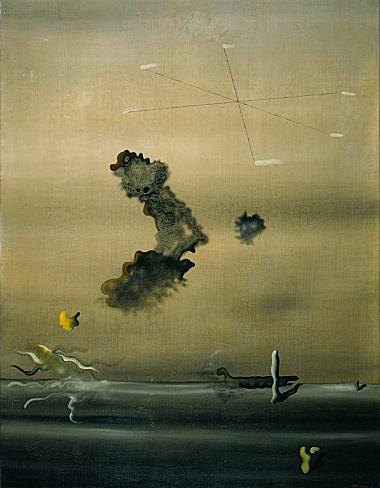 Dehors
[Outside]
1929
Yves Tanguy
5 January 1900 - 15 January 1955
______________________________________
Fixed Opinions, or The Hinge of History
Joan Didion
New York Review of Books
subscription only
We have come in this country to tolerate many such fixed opinions, or national pieties, each with its own baffles of invective and counterinvective, of euphemism and downright misstatement, its own screen that slides into place whenever actual discussion threatens to surface. We have for example allowed American biological research to fall behind that in countries where stem cell programs are not confused with "cloning" and "abortion on demand," countries in other words where rationality is not held hostage to the posturing of the political process. We have allowed all rhetorical stops to be pulled out on non-issues, for example when the federal appeals court's Ninth Circuit ruled the words "under God" an unconstitutional addition to the Pledge of Allegiance. (...)
All of these issues or non-issues are, as they say, just politics, markers in a game. The flag-burning amendment is just politics, the school prayer issue is just politics—a bone to the Republican base on the Christian right and a way to beat up on the judiciary, red meat for the "Reagan Democrats" or "swing voters" who are increasingly seen as the base for both parties. The prohibition on the creation of new cell lines from discarded embryos that constituted the President's "compromise" on the stem cell question is politics. The fact that Israel has become the fulcrum of our foreign policy is politics. When it comes to any one of these phenomena that we dismiss as "politics," we tend to forgive, or at least overlook, the absence of logic or sense. We tell ourselves that this is the essential give and take of democracy, we tell ourselves that our elected representatives are doing the necessary work of creating consensus. We try to convince ourselves that somewhere, beneath the posturing, there is a hidden logic, there are minds at work, there is someone actually thinking out the future of the country beyond the 2004 election.
These would be comforting notions were they easier to maintain. In fact we have created a political process in which "consensus" is the last thing the professionals want or need, a process that works precisely by turning the angers and fears and energy of the few—that handful of voters who can be driven by the fixed aspect of their own opinions—against the rest of the country. During the past decade— through the several years of the impeachment process and through the denouement of the 2000 election—we had seen secular democracy itself put up for grabs in this country, and the response to September 11 could not have encouraged us to think that the matter was in any way settled. ______________________________________
 Jeff and Mary by Long Hungry Creek
Red Boiling Springs, Tennessee
Taj Forer
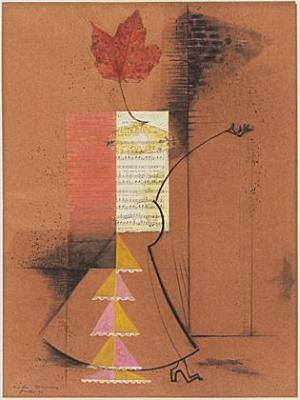 Street Singer
André Masson
4 January 1896 - 28 October 1987 205 images
______________________________________
The oxymoron of normality
Alexander Kiossev
eurozine
... when "normalization" has come to seem a fact, questions need to be asked. Why was the word "normal" so close to the hearts of eastern Europeans? How does its meaning in the context of eastern European transition compare to other historical usages of the word? Were there any hidden contradictions in this "normalization" programme? A conceptual history (Begriffsgeschichte)[2] of the words "normal" and "normality" is one possible tool for answering such questions. (...)
Reinhart Koselleck has warned that "Through alternation of the semasiological and onomasiological questions, Begriffsgeschichte aims ultimately at Sachgeschichte"[43] The history of concepts cannot replace the history of things, actors, and material processes – social history, in other words. However, the history of concepts can help to supplement the "normal" perspective of social history with viewpoints concerning the historical patterns of meaning and the expectations of those who act and interact. As demonstrated here, the meanings of crucial concepts such as "normal" and "normality" were multiple, historically changeable, contradictory, even oxymoronic. In order to better understand historical changes, one needs to be patient, to chase these details, twists, and contradictions. They mark the categories and limits of self-understanding which, in turn, makes meaningful historical actions possible while simultaneously setting semantic constrains on them. Some concepts mould the behaviour of historical agents. This makes their history at least as interesting as the history of material conditions.... (more) Normality or normalities?
From one transition to the next Mircea Vasilescu eurozine
______________________________________
 John Hassall
1908
poster collection
London Transport Museum
______________________________________
Wait
Adrienne Rich
In paradise every
the desert wind is rising
third thought
in hell there are no thoughts
is of earth
sand screams against your government
issued tent hell's noise
in your nostrils crawl
into your ear-shell
wrap yourself in no-thought
wait no place for the little lyric
wedding-ring glint the reason why
on earth
they never told you
no place for little lyric (PoemTalk #2)PoemTalk
a podcast series sponsored by the Poetry Foundation, the Kelly Writers House & PennSound
______________________________________
 Julien Gracq
(July 27, 1910 – December 22, 2007) 1 2 3
John Latta
Isola di Rifiuti
Gracq strikes one as a man unlikely to suffer the foolishness of fools, no matter whose fool fool be. He’s capable of delicious severity, point’d here (and often) at Paul Valéry:
Valéry’s reflections on literature are those of a writer in whom the pleasure of reading is at its minimum, the concern for professional verification at its maximum. This natural frostiness in the matter makes it so that each time he attacks a novel, it is in the manner of a leader of ancient gymnastics criticizing a lack of economy in the motions of coitus: he takes offense at wasted energy, the stakes of which he does not wish to consider.
He unfolds the limitations of cinema with a novelist’s palpable sense of the word’s—any word’s—deep nuance, its shimmer, the furriness of its edge, noting that—seeing a story “screen’d”—“what is clearest . . . is that the images, unlike those born of words and sentences, are never given coefficients of value or intensity: centered and circumscribed by the screen so the rays of light they emit strike the eye perpendicularly, the rule that presides over their sensory distribution is strictly egalitarian.” And continues:
To grasp this singularity, just imagine a cinema where, alongside a scene unfolding right in the optical field, other scenes or landscapes, related or different, would be vaguely and simultaneously perceived, in secret or in lost profile, from the corner of the eye . . . This domain of margins distractedly but effectively perceived, this domain of the corner of the eye—in order to compensate for other inferiorities, such as less direct dramatic efficiency, less of a sense of the present, the elastic vagueness proper to images born of literature—accounts for almost all the superiority of written fiction. The screen knows neither the plus sign nor the minus sign; it only uses the elsewhere sign, awkwardly, through abrupt ruptures in cameras angles, and is less skilled than literature at weighting the images it unfolds with the sign of infinity.... (more) ______________________________________
Introducing disagreement
Jacques Rancière
2003
I am not a "political philosopher." I do not believe generally in the "divisions" of philosophy. Nor do I believe in localising philosophy within some division of knowledges and discourses. For me, philosophy consists of singular nodes of thought which are opened by undoing the established divisions between disciplines. Indeed, against these divisions, I have continued to wander into literature, social history, politics, and aesthetics. And I have continued to do so because of problems and objects of thought thrown up by "non-philosophical" events.
So, in the wake of '68 and the thwarting of the hoped-for union of students' and workers' movements, I set out to reconsider the history of relations between workers' movements and utopias or theories of social transformation. I tried to understand the history of workers' emancipation from its beginning, to show its originary complexity, and the complexity of its relations with those utopias and theories.(...)
This is what "disagreement [mésentente]" means. It cannot be deduced from the anthropological fact of language. Nothing can be deduced from some anthropological property common to humanity in general, because the "common" is always contested at the most immediate level: the fact of living in the same world, with the same senses [sens], and the same powers of holding something in common. Deducing the existence of a common political world from the comprehension of language can never be natural when that world presupposes a quarrel over what is common. Mésentente - a term untranslatable into English - indicates this node in between two things. It means both "the fact of not hearing, of not understanding" and "quarrel, disagreement." Combining both meanings yields only this: the fact of hearing and understanding language does not in itself produce any of the effects of an egalitarian community. Egalitarian effects occur only through a forcing, that is, the instituting of a quarrel that challenges the incorporated, perceptible evidence of an inegalitarian logic. This quarrel is politics.... (more) ______________________________________
It is a very queer thing this not agreeing with any one. It would seem that where we are each of us always telling and repeating and explaining and doing it again and again that some one would really understand what the other one is always repeating. But in loving, in working, in everything it is always the same thing. In loving some one is jealous, really jealous and it would seem an impossible thing to the one not understanding that the other one could have about such a thing a jealous feeling and they have it and they suffer and they weep and sorrow in it and the other one cannot believe it, they cannot believe the other on can really mean it and sometime the other one perhaps comes to realise it that the other one can really suffer in it and then later that one tries to reassure the other one the one that is then suffering about that thing and the other one the one that is receiving such reassuring says then, did you think I ever could believe this thing, no I have no fear of such a thing, and I’d is all puzzling.......Gertrude Stein, The Making of Americans courtesy of with hidden noise
______________________________________
 Perth town hall and bandshell
awaiting the return of
The Perth Citizens Band
the oldest continuously operating band in Canada
______________________________________
If tonight's Iowa results prove anything, it's that religion isn't leaving the public square when W. rides home to Texas.
Jeff Sharlet
______________________________________
God and Country are an unbeatable team; they break all records for oppression and bloodshed.
- Luis Buñuel
 Sanctuary
Max Ernst
oil and collage on wood, 1965
from a much larger image lovingly scanned from a book by Edward Quinn
by misteraitch at Giornale Nuovo
______________________________________
Pentecostalism for the Exurbs
Joel Osteen's God really wants you to dress well, stand up straight, and get a convenient parking space.
By Chris Lehmann
Joel Osteen
"This is my Bible. I am what it says I am. I have what it says I have. I do what it says I can do," and building to an oddly colorful climax: "I am about to receive the incorruptible, indestructible, ever-living seed of God, and I will never be the same. Never, never, never. I will never be the same. In Jesus' name. Amen."
The chant is about as close as Osteen's relentlessly upbeat preaching ever comes to a theological doctrine, and it captures many of the key themes behind his runaway appeal. There's the stark individualist ethos that lies behind the definition of scripture as first and foremost an agent of identity change. There's the curiously infantile quality of both the act of the chant and its diction. (No matter how emphatically an arena full of believers may shout "Never, never, never," they always sound like pouting toddlers.) Most of all, though, there's the vividly sexualized power ascribed to the Word of God, which serves as a sort of skeleton key to the Osteen phenomenon.(...)
... if you bracket all the scary, irresponsible health-and-wealth cheerleading that jolts through Become a Better You, this exurban image of God the indulgent dad is among the more troubling features of the gospel according to Osteen. For it turns out that the divine hand turns up everywhere, at least in Joel Osteen's life. God upgrades his reservations to first class on a long international flight; God spares his car in a water-planing wipeout on the Houston interstate; God allows Osteen and his wife/co-pastor, Victoria, to flip a property "for twice as much as we paid for it" in a once-sketchy Houston neighborhood; God swings a critical vote on the Houston zoning board to permit Lakewood to move to its mammoth Compaq Center digs—and God even saw fit 35 years earlier to ensure the engineer who designed the ramps leading to the Compaq Center provided easy parking access for Lakewood. This is a long, long way down the road from the inscrutable, infant-damning theology of this country's Calvinist forebears—it is, rather, a just-in-time economy's vision of salvation, an eerily collapsible spiritual narcissism that downgrades the divine image into the job description for a lifestyle concierge.... (more)
______________________________________
WE SHOULD ALL LIVE LIKE ROCKS IN A FLAT FIELD
in the caves today
the pistil of a calla lily may be speaking:
. . .THE ROOF IS FALLING
The caves are membranes breathing, huge
petals the sun breaks through
soft skin greenhouse.
Must I experience total
collapse of psychic hierarchy?
Will the caves stop being caves?
Leveling. Everything's leveling.
Two Poems from Disobedience
Alice Notley
______________________________________
 Yucatan Mirror Displacement
1969
Robert Smithson
(January 2, 1938-July 20, 1973)
______________________________________
Where Is The Babylonian Meter With Its Lovely Caesura?
from Disobedience
by Alice Notley
"biggest problem in the world now is unity"
...lovely? Internet, business, the English language, no nature
beautiful...you're in charge, you member you
of the elite educated class it's all up to you to what
you choose to buy--the job you have
(what nearly lost culture
are you fucking over today?...)
And I assisting in this gruesome unification
by emigrating from America to France.
--------------------------
Perhaps Hardwood will take me on a tour of
Our Loss--later?
The soul's confidante as vital to her as I am to you dear.
... (more)
.....................................................................
The Poetics of Disobedience
Alice Notley
For a long time I've seen my job as bound up with the necessity of noncompliance with pressures, dictates, atmospheres of, variously, poetic factions, society at large, my own past practices as well. For a long time--well in fact since the beginning, since I learned how to be a poet inside the more rebellious wing of poetry; though learning itself meant a kind of disobedience, so like most words the Dis word, the Dis form, cannot be worshipped either--and that would be an obedience anyway. I've spoken in other places of the problems, too, of subjects that hadn't been broached much in poetry and of how it seemed one had to disobey the past and the practices of literary males in order to talk about what was going on most literarily around one, the pregnant body, and babies for example. There were no babies in poetry then. How could that have been? What are we leaving out now? Usually what's exactly in front of the eyes ears nose and mouth, in front of the mind, but it seems as if one must disobey everyone else in order to see at all. This is a persistent feeling in a poet but staying alert to all the ways one is coerced into denying experience, sense and reason is a huge task. I recently completed a very long poem called Disobedience but I didn't realize that disobeying was what I was doing, what perhaps I'd always been doing until the beginning of the end of it, though the tone throughout was one of rejection of everything I was supposed to be or to affirm, all the poetries all the groups the clothes the gangs the governments the feelings and reasons.... (more)
______________________________________
Happy Workers pledge themselves
to the obstruction of their desire.
from
A Romance Of Happy Workers
Anne Boyer
Workers who do not own the means
misprize it, find it hovers
over head instead of sleep. Ophelia
barters for love, swallows silt.
Here rosemary. Here Hamlet's kiss.
Imagine at once a particle and its velocity.
Imagine your comrade's tributaries:
they all spill over for you.
A revolutionary has no principle
for uncertainty. Madame Tsvetaeva
reads his hand, feels Kill Creek:
this line here means your heart still beats. ... (more)
TYPO
 The Romance of Happy Workers will be released by Coffee House Press pre-order at Amazon
cover by K. Silem Mohammad
______________________________________
New Year’s party still going for top CEOs
By the time most Canadians roll up their sleeves to begin a new year of work, Canada's best paid 100 CEOs will already be having a good year: They'll pocket the national average wage of $38,998 by 10:33 am January 2nd.
And they will continue to earn the average Canadian wage every nine hours and 33 minutes for the rest of the year, according to a new report on CEO pay by the Canadian Centre for Policy Alternatives (CCPA).
The Great CEO Pay Race: Over Before it Begins - PDF
via Theoria: Blog______________________________________
Alex Golub celebrates the seventh anniversary of his blog.
Alex also contributes to Savage Minds ______________________________________
The Last Edition
Riley Dog
01/2000 - 01/2008
Thanks for the years of your idiosyncratic distillations Steve. ______________________________________
Ron Silliman reviews OCHO 14
Guest edited by Nick Piombino
______________________________________
 photo - mw ______________________________________
Taking wood back to forest.
136 Vietnamese figures of speech and proverbs translated from the Vietnamese
Linh Dinh via ______________________________________
Outcast Narrative
Harold Jaffe
electronic book review
The master narrative that encompasses us despises the flesh and blood body. More precisely, it despises the body when it can’t market the body.(...)
For most people, narrative primarily suggests “story” and the creative imagination. Official culture’s story, endlessly recirculated, recounts its own virtue and triumphs, such that a single word or phrase is enough to engender not just an image but a sequence of images which in effect “tells” the legislated story.(...)
Jean Baudrillard wonders rhetorically: “Are there two lines to our lives, the one a non-biological, imemorial youth, which we experience in dreams, and the other an organic line of life and death, of duration and of remembrance, with which we identify our pale and mortal existence? Could there be two fundamental sequences and no relation to them? Or is the first simply the projection of the second, its hallucinatory discourse, as, deep, down psychaoanalysis argues.” Baudrillard endorses the first hypothesis: “We have two existences, each of which is wholly original and independent of the other.” Does dream, then, represent perhaps our last frontier, a mode infiltrated by official culture but still maintaining a degree of autonomy which could be channeled into dissident, conceivably even revolutionary, agency via art? It is disputable whether dream is uncontaminated, but let's assume that it mostly is. At some juncture, then, dream-as-narrative might re-seize its dissident potential, as happened, for example, with German Expressionism and Surrealism. But that juncture is not now. People (I'm talking principally of Americans) will have to live and breathe the new world order for some time longer before they come to realize (if they ever do) that the master narrative is strangling rather than succoring them. That they're not grinning and waving but grimacing and drowning.... (more)
Happy New Year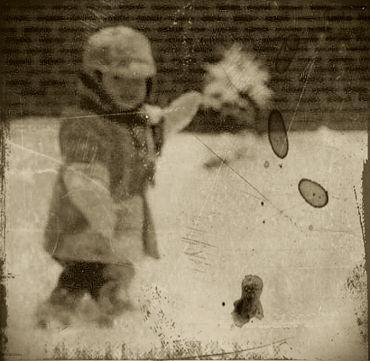
myself c.1953
some time before I started worrying about acquiring a mind of winter ______________________________________
winged with wrath / necrologist with discipline
Anna Hoffmann
translated by Catherine Hales
born with a fall into the collective
grammar hammered deep into the hypothalamus
every I a we that was dreaming
venus-anus-vanitas
mine is the outcast
the culled cattle that bellows
beneath the bloated moon
that pulses in the candied peel of barren suns
my day has no place no year
& every we just an I
torn out / papered on
a story without a story
psychosomatically we cut open
our arteries after barely
sleeping through our resurrection
of course there are ineradicable
connections between my
throat & your hands as long as we
hold on to each other
you play first violin in the wrath of god
(everything conceivable)
COMMON SENSE IS A LIE
like any other word
and woman a safety valve
archaeology today: an old man a child-
hood friend an outsider
three witnesses of future force
groaning I show it the way
to the country of origins that's wetter
than euphrates & tigris
where the traces of the latest sacrifice
are bloodier than the hands of the hun
how many epochs per centimetre
& THAT too sinks in the silence of tongues
no man's land
Working together with Berlin's cult literary magazine lauter niemand, no man's land features first-ever translations of fiction and poetry by some of the finest young writers working in German today.
via Absinthe: New European Writing
______________________________________
 Wynn Bullock
1902 - 1975 1 2 3 4
______________________________________
New Year's Day History, Custom and Tradition
Follow Me Here...
______________________________________
2007 in Review: Power, Politics and Resistance Pt. 1
Democracy Now!
Pt. 2
______________________________________
 The Ship of Fools
detail
Hieronymus Bosch
|















































